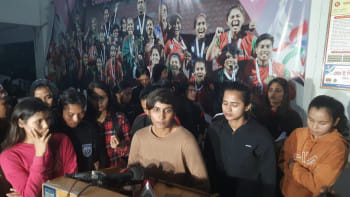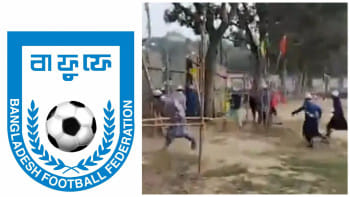The misdirected outrage over the women’s football team strike

A section of players of the Bangladesh national women's football team went on a training strike last week over alleged behavioural issues of coach Peter Butler, and the Bangladesh Football Federation's (BFF) apparent lack of action despite repeated complaints. The strike, which involved 18 national team players, including many of the stars of the two recent SAFF Championship wins, is not unprecedented in sports. Players banding together to force out management—both fairly and unfairly—is a regular occurrence. However, the vitriol hurled towards our footballers and the refusal to acknowledge their grievances has been eye-opening. It is yet another reminder of how we as a society fail to acknowledge the humanity of athletes, the dignity of women, and when it comes to female athletes, the sheer lack of respect.
On the players' part, they have communicated quite clearly the reasons behind their demands. The three-page joint statement made by the players details both specific incidents of ineptitude and misconduct by the coach and the generally abrasive nature of his demeanour. If these allegations made by the players hold true, Butler has a lot to answer for—not least his decision to "wilfully" field lesser experienced players in an important match against Pakistan, his miscalculation over the number of substitutions allowed in a game, and his abusive pitchside behaviour towards a player.
The statement also mentioned the coach's off-pitch behaviour, and much of the players' grievances have to do with his derogatory tone and offhand comments about their clothing, bodies, and their personal lives. The allegation is that he has created an environment of terror, disrespect, and division within the team.
As mentioned before, sports fans in the 21st century are more than familiar with "player power." It is a phrase that is negatively used to refer to the fact that players across different sports and different nations make up the most powerful group within a team structure, and often band together to oust coaches and other management staff with whom they fail to get along. A recent example would be the litany of first team coaches fired at famous football club Manchester United, where the players have consistently failed to perform over many years, but instead of any wholesale changes to the squad, each time the coach is pushed under the bus.
Another example closer to home would be our own national men's cricket team, where for years, it has been alleged that coaches have had to navigate the egos and the demands of the core group of senior players or face unceremonious sackings. In none of these cases did the players ever come out in the media and spell out clearly what their problems were. Their star power was enough to move the pieces in the back rooms while things changed in the public eye according to their wishes.
Yet, with the national women's football team, despite being presented with a detailed account of the background to their revolt, the public seems to be largely unconvinced. The public, as sampled on social media, seems to be appalled by the idea that players are humans too, who demand to be treated with the respect that every person earns by the virtue of being born. Fans have reacted harshly to the players' allegation that the details of their personal lives were being questioned by their coach, which is a clear violation of a professional relationship. Many fans are saying that the players want "impunity" for their "antisocial behaviour," whatever that means. Many have even speculated that the players have cried body shaming because their fitness issues may have been pointed out by the coach, but the audacity of regular people sitting at home assuming a professional athlete does not know the difference between fitness demands and body shaming is perplexing.
The criticism has wholly overlooked the technical deficiencies of the coach pointed out by the players. People have even gone so far as to belittle the achievement of the two-time SAFF Champions, overlooking the fact that these were the only regional accomplishments for a Bangladeshi team in football or cricket in almost two decades. The worst excess of all has been the abuse players have been subjected to on their personal social media handles—abuse that has extended to death and rape threats, as stated by Matsushima Sumaya, one of the national team players whose "crime" was to help her teammates write a letter in English.
In Bangladesh, people seem to have an obsessive and unhealthy sense of entitlement from athletes. It is lost on spectators that athletes go through an extremely difficult journey to get to a position where they can don the national colours, and if they fail to perform, people like to say that the money being spent on them is a waste. The truth, however, is never as simple. The money sports bodies spend on players is made because of the players. It is because players are successful or have star power that a sport makes any money at all, and this is the pool from which boards like BFF pays players. The footballers' strike that has disrupted the women's team's training seems to have stoked this sense of entitlement among fans, who think—mistakenly—that the players and their well-being were not the major factors behind the team's recent success.
The public reaction to this whole ordeal has gone off the charts in its harshness and disproportionate toxicity. And given Bangladesh's social context, one has to wonder what part the gender of the players had in eliciting this reaction. However, the thing about misogyny and prejudice is that they always bubble under the surface, and it doesn't take a lot for them to seep through.
For instance, when a letter from the players reached the BFF president, its contents were not the primary topic of discussion. News outlets quoted members of a special BFF committee expressing surprise that these players could pen a letter in English, and apparently that has become a major point of the investigation. Would this have even been a humorous thought had the players been men?
On the other hand, coach Peter Butler has gone out and spoken to the media in a tone that lends credence to the players' allegations and also epitomises the derisive way these players are being spoken about right now. It may just be that the people of the country are taking cues from responsible authorities like the BFF officials and the national team coach on how to mistreat some of the most successful athletes in the country's history.
"You gotta remember, I'm from the football culture, where if they performed and did things which they had been doing here, they would be upstairs, having their bags packed, they'd be frogmarched down the stairs and kicked out into the streets," he told reporters on Wednesday.
"I mean, do they understand what it's like to work in a department store, stack shelves, and do menial work? They are lucky girls."
I, for one, am outraged that a coach gets to speak like this about my country's national footballers. Why the rest of the country is outraged over the training strike but not this tone of language is a question without an answer.
Azmin Azran is digital features coordinator at The Daily Star.
Views expressed in this article are the author's own.
Follow The Daily Star Opinion on Facebook for the latest opinions, commentaries, and analyses by experts and professionals. To contribute your article or letter to The Daily Star Opinion, see our guidelines for submission.

 For all latest news, follow The Daily Star's Google News channel.
For all latest news, follow The Daily Star's Google News channel. 











Comments